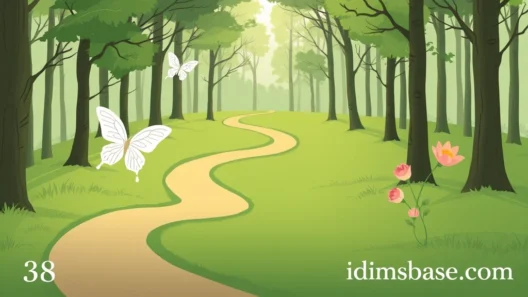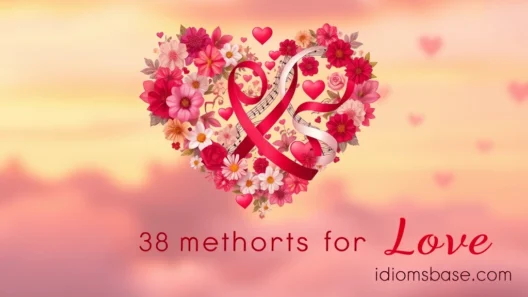Ever felt that incredible rush when you finally tick off a big goal? That feeling of crossing the finish line, hitting the bullseye, or even just nailing that tricky recipe? It's more than just finishing something; it's about making it happen, bringing it to life, and truly accomplishing it!
Sometimes, finding the right words to describe that feeling, or the act of achieving something, can be a little tricky. That's where metaphors come in! They paint vivid pictures in our minds, helping us understand complex ideas by comparing them to something simpler and more familiar. So, if you're looking to spice up your language, inspire your team, or just appreciate the beauty of language, you've come to the right place.
Let's dive into 38 fantastic metaphors for "accomplish" that will add flair, depth, and a touch of magic to your conversations and writing!
38 Metaphors for Accomplish
Get ready to explore some truly creative ways to talk about achieving your goals!
- Hitting the Bullseye: This classic metaphor instantly brings to mind precision and accuracy. You didn't just aim; you hit the exact spot you intended. It suggests a perfect outcome.
- Crossing the Finish Line: Imagine a runner, exhausted but exhilarated, breaking the tape. This metaphor emphasizes the journey, the effort, and the ultimate completion of a race or task.
- Reaching the Summit: Think of a mountain climber, finally standing atop a towering peak. This implies overcoming significant challenges and reaching a high point of achievement.
- Striking Gold: This brings to mind prospectors digging for treasure. It suggests discovering something incredibly valuable or achieving a highly rewarding outcome, often after much searching.
- Nailing It: A very common, informal metaphor. It means you've done something perfectly, precisely, and effectively. Like hitting a nail squarely with a hammer.
- Sealing the Deal: This metaphor comes from business or negotiations. It means finalizing an agreement or making a success official. It implies closure and a positive outcome.
- Bringing it Home: Often used in sports, this means securing a victory or completing a task successfully, especially after a concerted effort. You've delivered the desired result.
- Planting the Flag: This evokes images of explorers claiming new territory. It signifies establishing a presence, making a significant mark, or being the first to achieve something.
- Building a Bridge: This suggests creating a connection, overcoming a divide, or completing a complex structure. It implies constructive effort and successful completion.
- Cracking the Code: This metaphor points to solving a difficult puzzle or understanding something previously incomprehensible. It highlights intellectual accomplishment and breakthrough.
- Turning the Key: Imagine unlocking a door or starting an engine. This signifies initiating success, making something operational, or finding the crucial element to make it work.
- Hitting a Home Run: From baseball, this means achieving a spectacular and undeniable success. It’s an impressive and impactful accomplishment.
- Drawing a Masterpiece: This implies creating something of beauty, skill, and lasting value. It emphasizes the artistic and refined nature of the achievement.
- Spinning Gold from Straw: A reference to Rumpelstiltskin, this means achieving something seemingly impossible or transforming something worthless into something incredibly valuable.
- Unlocking a Door: Similar to "turning the key," this suggests gaining access, finding a solution, or opening up new possibilities through your efforts.
- Landing the Plane: This implies bringing a complex or challenging situation to a safe and successful conclusion. It highlights skill and careful execution.
- Sailing Smoothly: This metaphor suggests achieving a goal with ease and without significant obstacles. It implies efficiency and a lack of friction.
- Making a Splash: This means achieving something that gets attention and creates excitement. It's an accomplishment that makes an impact on others.
- Lighting the Fuse: This metaphor suggests initiating a process that leads to an explosive or significant outcome. It's about setting things in motion for a big result.
- Hitting the Jackpot: This implies a sudden, unexpected, and significant success, often due to luck or a fortunate turn of events. It's a big win!
- Weaving a Tapestry: This suggests a complex and intricate process that results in a beautiful and cohesive whole. It emphasizes careful crafting and integration.
- Orchestrating a Symphony: This implies skillfully coordinating many different elements or people to produce a harmonious and successful outcome. It's about masterful direction.
- Casting a Spell: This suggests achieving something magical or seemingly impossible through your actions, often with an element of charm or influence.
- Flipping the Switch: This means initiating a process or making something active that leads to a desired result. It's about creating an immediate change.
- Cutting the Ribbon: This signifies the official opening or completion of a project or venture. It's a ceremonial act marking success.
- Putting the Puzzle Together: This implies successfully assembling various pieces or elements to form a complete and coherent picture or solution.
- Finding the Missing Piece: This means discovering the crucial element that makes a project or plan complete and successful.
- Hitting Pay Dirt: Similar to "striking gold," this means finding something valuable or achieving success after considerable effort.
- Making Your Mark: This signifies leaving a lasting impression or achieving something memorable and significant.
- Bringing it to Fruition: This botanical metaphor suggests cultivating an idea or effort until it bears fruit, meaning it comes to a successful completion.
- Turning a New Leaf: While often about personal change, it can also mean successfully completing a phase and starting afresh, having accomplished a previous objective.
- Reaching the Pinnacle: Similar to "summit," this implies reaching the highest point of success or achievement in a particular field.
- Drawing the Blueprint: This implies successfully planning and designing something complex, laying the foundation for its creation.
- Filling the Basket: This suggests gathering all the necessary items or completing all the required tasks to achieve a goal.
- Landing on Your Feet: This implies successfully navigating a difficult situation and emerging unharmed or even better off. It's about resilience and success against odds.
- Putting the Cherry on Top: This means adding the final, perfect touch that completes and enhances an already good achievement.
- Building a Legacy: This signifies achieving something so significant and lasting that it will be remembered and impactful for future generations.
- Unveiling the Masterpiece: This implies revealing a completed work of great skill and effort, often after a period of creation or secrecy.
Key Takeaways
Using metaphors for "accomplish" isn't just about sounding fancy; it's about making your communication more impactful and memorable.
- Vivid Imagery: Metaphors paint pictures, making your message more engaging.
- Emotional Connection: They evoke feelings and experiences, helping your audience relate.
- Clarity and Understanding: Complex ideas become easier to grasp through relatable comparisons.
- Inspiration: Strong metaphors can motivate and energize, encouraging action and perseverance.

So, next time you're celebrating a win, big or small, try reaching for one of these powerful metaphors. You might just "hit the bullseye" with your words!
Frequently Asked Questions (FAQ)
You've got questions, and we've got answers! Let's dive deeper into the world of metaphors for accomplishment.
Q1: Why are metaphors important in communication?
Metaphors are incredibly powerful tools in communication because they allow us to explain complex ideas by comparing them to simpler, more familiar concepts. They add color, depth, and emotion to our language, making our messages more memorable and engaging. Think of it like this: instead of just saying "we finished the project," saying "we crossed the finish line" adds a sense of journey, effort, and triumph. They help your audience visualize and connect with your message on a deeper level.
Q2: How can I choose the best metaphor for a specific situation?
Choosing the best metaphor depends on the context and the specific nuance you want to convey.
- Consider the feeling: Do you want to emphasize skill ("nailing it"), effort ("reaching the summit"), or impact ("making a splash")?
- Think about your audience: Will they understand the reference? A sports metaphor might resonate with one group, while a business metaphor might resonate with another.
- Match the tone: Are you aiming for something formal, informal, serious, or lighthearted? "Bringing it home" is casual, while "orchestrating a symphony" is more formal.
- Look at the journey: Did the accomplishment involve overcoming great obstacles ("cracking the code") or was it a smooth process ("sailing smoothly")?
By considering these points, you can select a metaphor that perfectly fits your message.

Q3: Can I create my own metaphors for "accomplish"?
Absolutely! The beauty of language is its flexibility. Creating your own metaphors can be a fun and creative exercise. Start by thinking about the core idea of "accomplish" – what does it feel like? What does it look like?
- Is it like solving a puzzle?
- Is it like building something from scratch?
- Is it like overcoming a physical challenge?
Once you have an idea, try to find a concrete image or action that represents that feeling or process. For example, if accomplishing a goal feels like finally seeing the sun after a long storm, you might say "we finally saw the sun break through the clouds." The more original your metaphor, the more impactful it can be!
Q4: Are there any common pitfalls to avoid when using metaphors?
Yes, there are a few things to watch out for:
- Overuse: Don't sprinkle too many metaphors into a single conversation or piece of writing, as it can become confusing or sound forced.
- Mixed Metaphors: Avoid combining two unrelated metaphors in one sentence (e.g., "We need to hit the ground running and then put the cherry on top"). This creates a jumbled and nonsensical image.
- Obscurity: Make sure your metaphor is understandable to your audience. An overly niche or complex metaphor might leave people scratching their heads.
- Clichés: While some common metaphors are effective, relying too heavily on tired clichés can make your language sound unoriginal. Try to add a fresh twist or choose a less common option.
By being mindful of these points, you can ensure your metaphors enhance, rather than detract from, your message.
Q5: How do metaphors differ from similes when talking about accomplishment?
This is a great question! Both metaphors and similes are figures of speech that make comparisons, but they do so in slightly different ways.
- Metaphors state that one thing is another. They create a direct equivalence. For example, "Achieving that goal was hitting the bullseye." Here, the accomplishment is the bullseye.
- Similes state that one thing is like or as another. They use "like" or "as" to draw a comparison. For example, "Achieving that goal was like hitting the bullseye."
While both are effective, metaphors tend to be more powerful and evocative because they assert a stronger, more direct connection between the two things being compared. Similes offer a gentler comparison.
Q6: Can metaphors for accomplishment be used in a professional setting?
Absolutely! Using metaphors in a professional setting can make your communication more engaging, memorable, and persuasive.
- In presentations: A well-chosen metaphor can help explain complex strategies or inspire your team. Saying "we're building a bridge to our future success" is far more impactful than just "we're working on our future success."
- In team meetings: Celebrating achievements with vivid metaphors can boost morale. "Great job, team, you really nailed that presentation!"
- In reports or proposals: Metaphors can help illustrate the significance of your work or the potential impact of a project.
- In leadership: Leaders often use metaphors to cast a vision, motivate their teams, and make abstract goals feel more concrete and achievable.
Just remember to choose metaphors that are appropriate for your audience and the professional context, avoiding overly informal or obscure comparisons.







